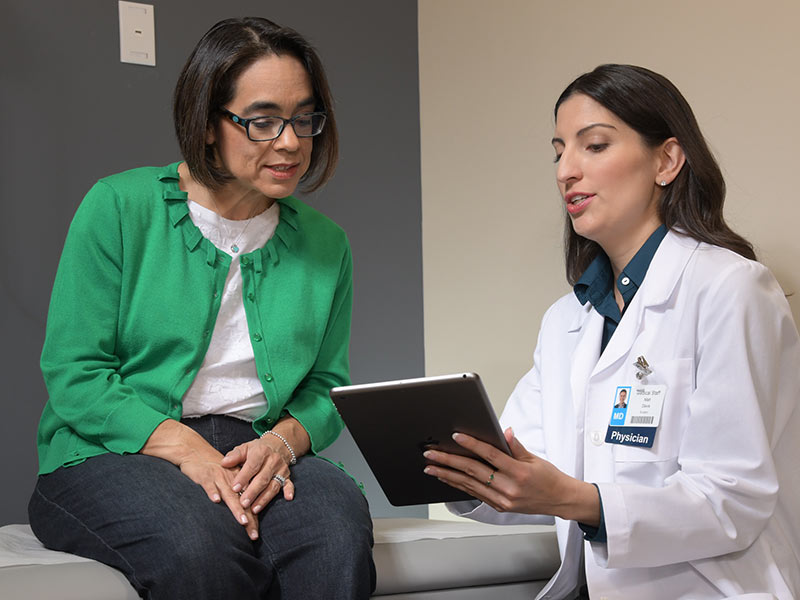-
20s & 30s
Recommended Health Screenings
- Annual Breast Exam
- Pap smear (cervical cancer screening):
- Pap smear every 3 years once 21 years old
- Starting in your 30s, add a paper smear with human papillomavirus (HPV) test every 5 years
- Immunizations
- HPV vaccine series before the age of 26
- Tdap vaccine every 10 years once 20 years old
- Varicella vaccine if never had chickenpox
How Your Body May Change
By the time a woman reaches 21, she has already experienced some significant changes in her body. Growth spurts and puberty are just a few. But as you enter adulthood, the next several decades can bring about even greater physical turmoil. From wicked bad cramps in your 20s to a slower metabolism in your 30s, age can present its challenges. Here are some other changes to be on the lookout for during this time.
- Adult acne: Pesky hormones are partially to blame, but stress and poor eating habits —like excess starchy carbs and dairy products — as well as smoking can add to breakouts.
- Loss of baby fat: Say goodbye to chubby cheeks and hello to a firmer face in your 20s as collagen in your skin begins to diminish and fat distribution shifts.
- Gradual bone and muscle loss: In your 30s is a good time to increase your exercise and make some dietary changes to help reduce weight gain. If you plan to have babies around this time, these lifestyle changes will also help you shed excess baby weight post childbirth.
- Hormonal upheaval: Welcome to your 30s and the decade of PMS, fibroids and other female discomfort. By age 35, your fertility also starts to drop off and you may even begin entering perimenopause (the years leading up to menopause). All of this can cause mood swings, sleep disturbances and/or anxiety if health isn’t made a priority.
Tips to Maintain a Healthy Lifestyle
- Eat healthy: incorporate fruits and vegetables, whole grains, varied proteins and dairy into your daily meals
- Exercise: Get at least 30 minutes of daily physical activity, including stress-reducing exercises (such as yoga) and weight-bearing movements to build muscle mass
- Sleep: Get at least 7 to 9 hours of sleep each night
- Maintain a healthy weight: Reach and maintain a healthy weight as supported by your doctor
- Stop smoking: Get help to quit or not start smoking
- Limit alcohol consumption: Limit alcohol use to 1 drink or less per day
- Talk to your doctor: Talk to your doctor at least once a year about any planned pregnancies, lifestyle or health changes, and more
-
40s, 50s & mid-60s
Recommended Health Screenings
- Annual Mammogram
- Diabetes Screening: Every 3 years for women 45+
- Pap smear (cervical cancer screening): Pap smear with human papillomavirus (HPV) test every 5 years
- Colorectal cancer screening:
- Regular screenings starting at age 50
- Colonoscopy every 10 years beginning at age 45
- Immunizations: Tdap vaccine every 10 years
How Your Body May Change
With menopause approaching somewhere north of 40, a woman’s body and mind starts going through a cascade of changes. Not only are your hormones changing, your lifestyle may be changing as you care for children and parents. Here are some things that may be on the horizon as you approach midlife.
- Weight creep: From hourglass to apple, a woman’s body shape is one thing that can change rather dramatically from her 20s to her middle age. It’s common for a woman to see an increase in the number on the scale during this time.
- Your monthly cycle goes rogue: It would be nice if the ovaries gradually made less estrogen, but it’s more of an unpredictable pattern. Estrogen levels can vary widely each month once perimenopause hits, typically in the 40s or 50s. As a result, cycles can be closer together or much farther apart; you could have extremely heavy periods now and again, and there may be months where you unexpectedly skip your period altogether. Hot flashes and more signal the coming loss of a woman’s reproductive capacity with menopause.
- Hair loss: Thinning hair can become especially noticeable in a woman’s 40s, thanks (again) to perimenopause.
- Foggy brain: This is not just because of the normal aging process — it’s part of the normal female aging process. Women have estrogen receptors in two brain areas that control memory, and when there’s less estrogen, structural changes occur in those areas causing memory loss.
- Leaky bladder: Pregnancy, childbirth and menopause can all contribute to loss of bladder control. That “gotta go” feeling along with the occasional leakage that happens with coughing, sneezing, or laughing affects about 40 percent of women over 40, according to Prevention.com.
- Broken bones: Approximately one in two women 50 or older will suffer a broken bone because of osteoporosis, according to the National Osteoporosis Foundation. Thanks to declining estrogen at menopause, women’s bones thin fastest between ages 50 and 60, leading to an increase in fractures.
Tips to Maintain a Healthy Lifestyle
- Eat healthy: incorporate fruits and green vegetables, whole grains and varied proteins into your daily meals to combat perimenopause weight gain
- Exercise: Get at least 30 minutes of daily physical activity to prevent bone density loss
- Sleep: Get at least 7 to 9 hours of sleep each night
- Maintain a Healthy Weight: Reach and maintain a healthy weight as supported by your doctor
- Quit smoking: Get help to quit or not start smoking.
- Limit alcohol consumption: Limit alcohol use to 1 drink or less per day
- Talk to your doctor: Talk to your doctor at least once a year about birth control (for premenopausal women), perimenopause/menopause symptoms, and lifestyle or health changes
-
65+
Recommended Health Screenings
- Annual Mammogram
- Diabetes screening: Every 3 years
- Colorectal cancer screening:
- Regular screenings up to age 75
- Colonoscopy every 10 years
- Hearing test: Regular checks begin at 65
- Osteoporosis screening: Women over age 65 should have a bone density test
- Immunizations:
- One-time shingles vaccine
- Pneumococcal vaccine at 65 and every 5 years after that
How Your Body May Change
Now is the time to embrace aging well. And don’t think it’s too late to make lifestyle choices that will boost your health. With a healthy lifestyle and preventive health care, you can reduce or prevent many health problems associated with aging. Here are some things you may want to watch for in your mid-60s and beyond.
- Fewer blemishes, more age spots: The good news is your skin becomes drier with age, so you’re less likely to suffer from breakouts. What you may notice is your skin is more fragile, and more prone to bruising and age spots.
- Achy joints: Aging and inactivity can lead to the wearing down of joint cartilage, loss of lubricating joint fluid and weaker muscles. Weight gain can work against good joint health so try to maintain a normal weight for your size.
- Osteoporosis: Much like in your 50s and early 60s, you need to be concerned with bone loss that can lead to fractures.
- More nighttime trips: Stress incontinence, that urine loss when you cough or sneeze, affects one in three women in their 60s, says AARP. And women in their 60s also are more prone to experience urge incontinence (an uncontrollable urge to “go”), especially at night).
Tips to Maintain a Healthy Lifestyle
- Eat healthy: incorporate fruits and vegetables, whole grains, varied proteins and dairy into your daily meals
- Exercise: Get at least 30 minutes of daily physical activity, including yoga and pelvic floor or other targeted exercises that focus on balance and muscle strength for certain areas
- Sleep: Get at least 7 to 8 hours of sleep each night
- Maintain a healthy weight: Reach and maintain a healthy weight as supported by your doctor
- Stop smoking: Get help to quit or not start smoking
- Limit alcohol consumption: Limit alcohol use to 1 drink or less per day
Talk to your doctor: Talk to your doctor at least once a year about depression or other mental health concerns, bone health, who will make health decisions for you if you’re unable to and more
What you should be looking out for, no matter your age
- Blood pressure check: every 1-2 years
- Cholesterol screening: every 5 years
- Skin cancer screening: every year with monthly self-checks
- Annual flu vaccine
Be sure to stay in touch with your primary care physician and OB/GYN to learn which additional screenings may be needed based on your family history.
These recommendations are for healthy women with no additional risk factors. If you’re at an increased risk based on your family history or an existing health condition, talk to your doctor about when screenings are appropriate.
Source: U.S. Department of Health & Human Services, Office on Women’s Health
Screenings may vary based on health history


